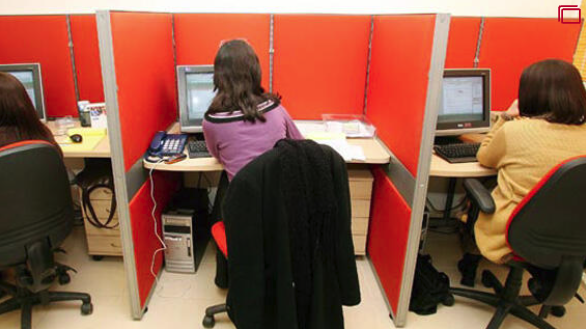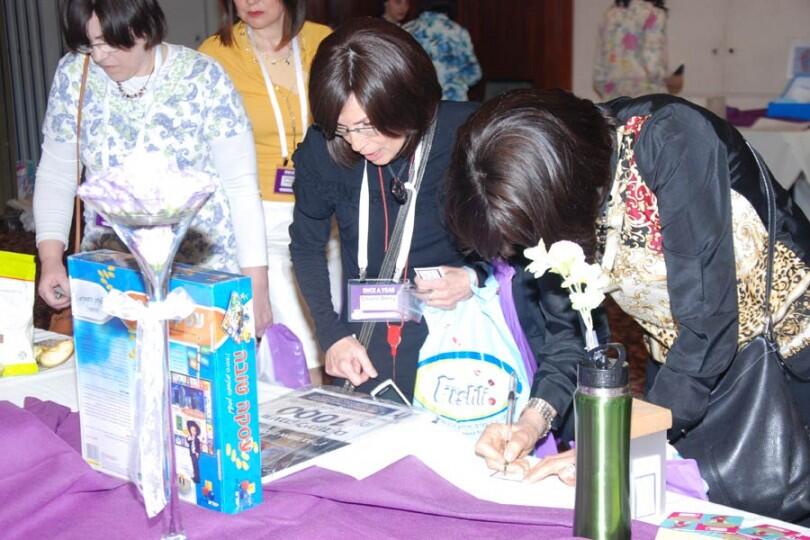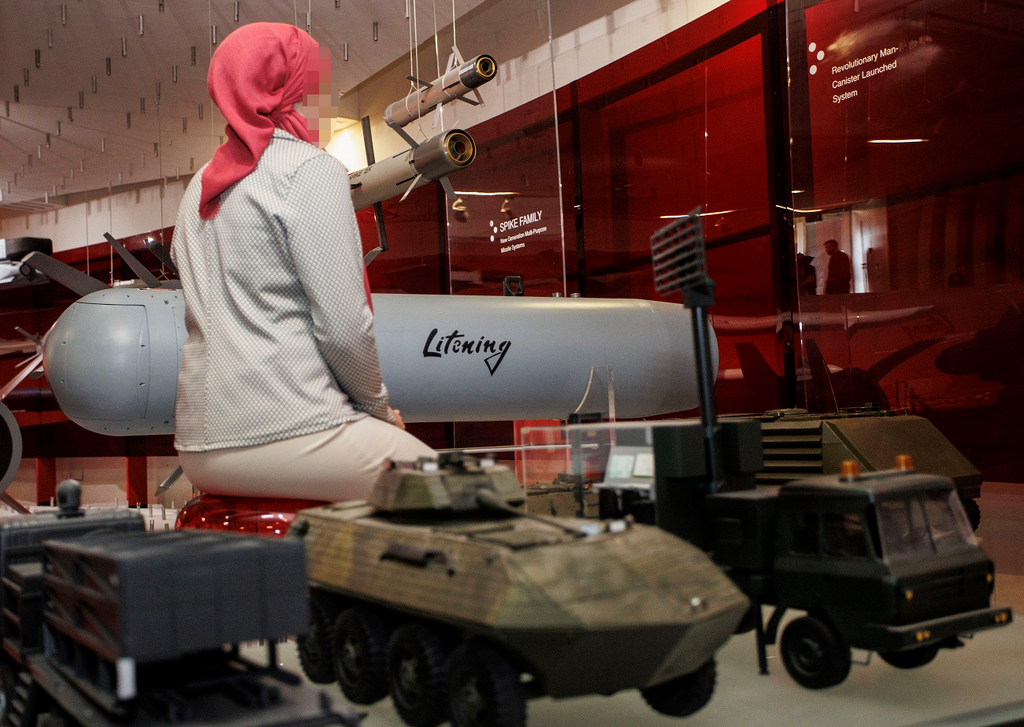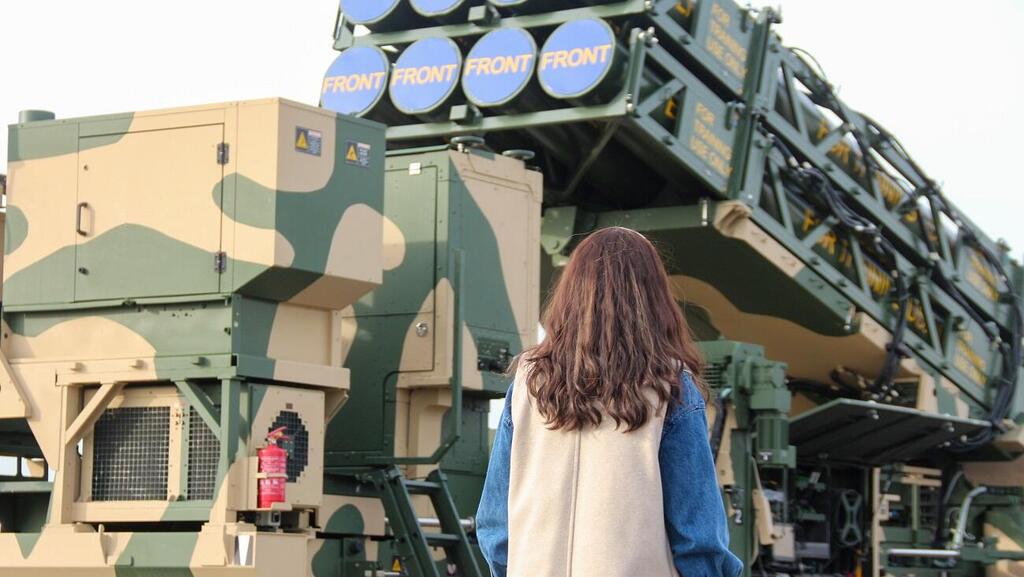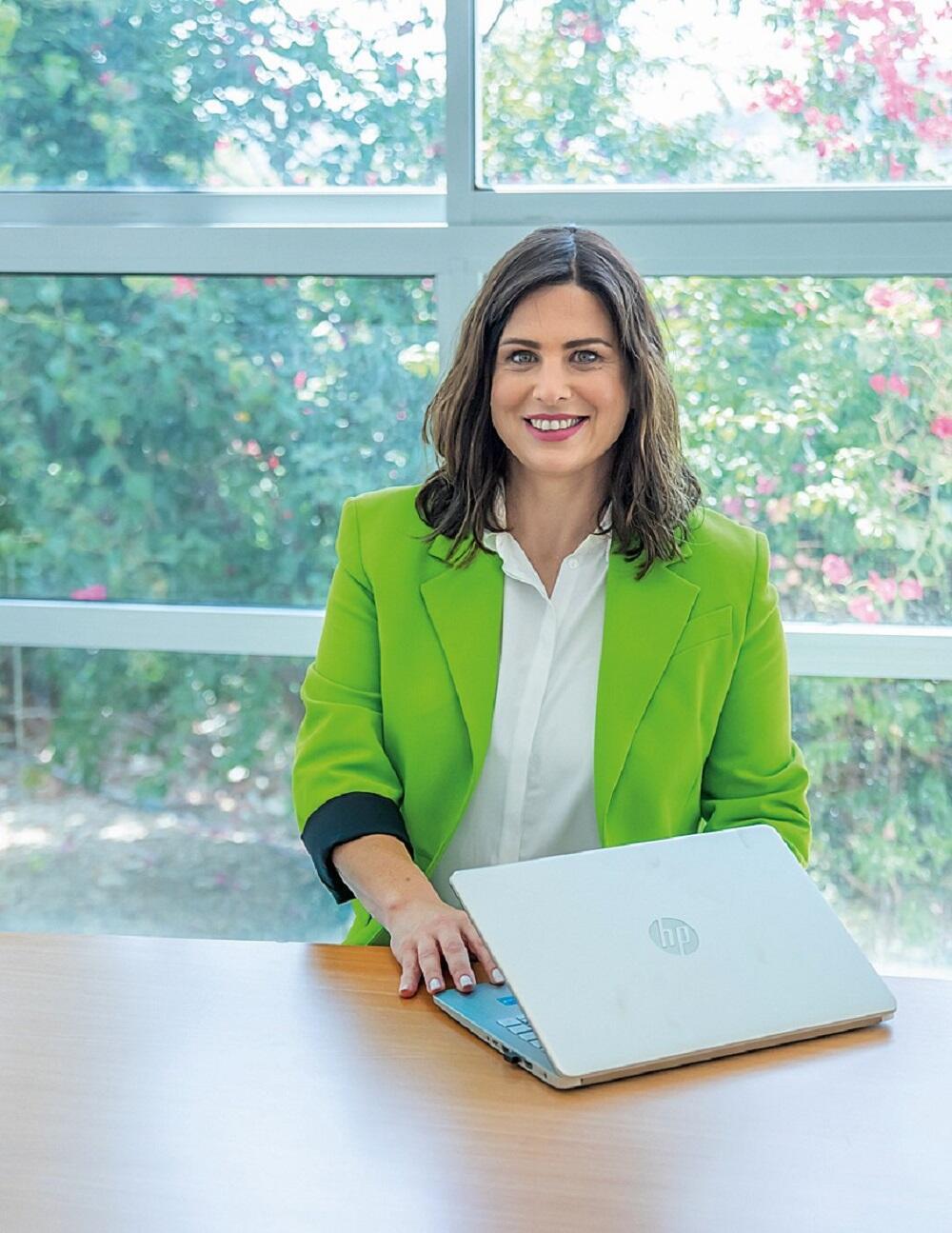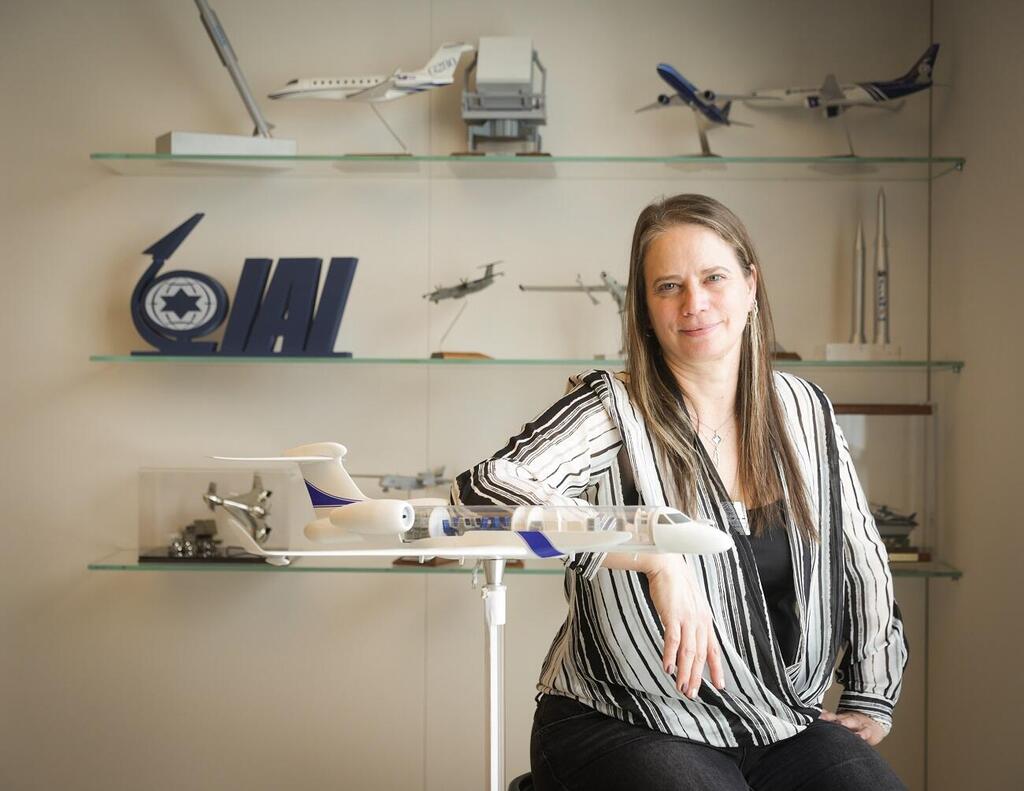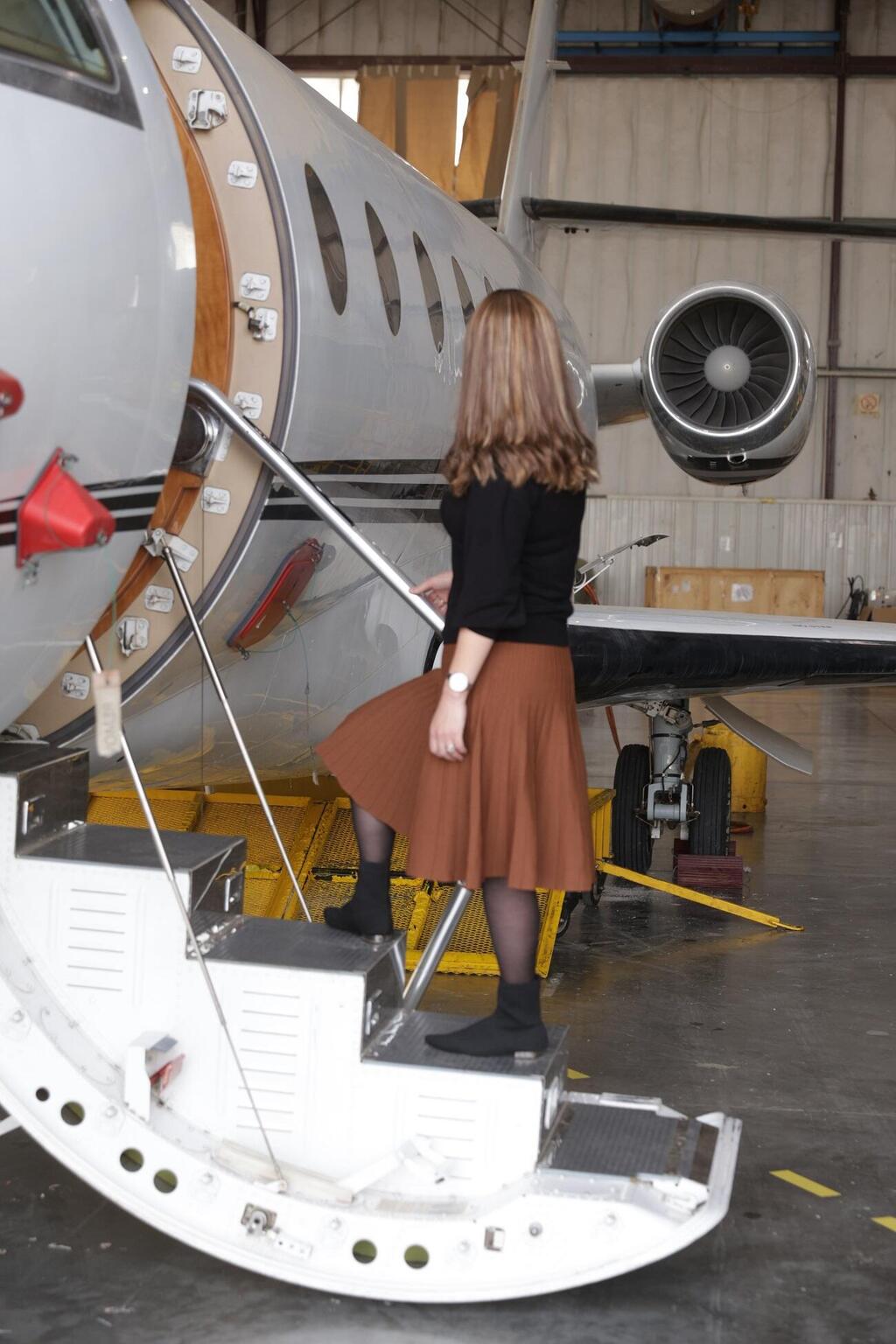"Once I was the only ultra-Orthodox female engineer, today we fill up an entire bus"
This surprising process is happening pretty much under the radar: an increasing number of Haredi (ultra-Orthodox) women engage in weapons development in the Israeli defense industries and even in the Air Force and the IDF's elite intelligence units. Now not only hi-tech companies know about their great potential, but the defense industry starts revealing it too. The war is expected to make it a more common occurrence. On the other hand, it is still a sensitive and complex issue that disturbs the ultra-Orthodox society. "My children do not hide where their mother works. Now, with the war ongoing, they are being addressed with questions, my son's Yeshiva peers are asking him about the Iron Dome"
Read more:
Sarah (pseudonym), 38 years old, lives in an ultra-Orthodox community in the north, married to a Yeshiva student and mother of five; she completed her studies of sports education at a long-standing ultra-Orthodox college years ago. Three months as a substitute teacher were enough for her to realize that teaching was not her vocation. "I applied for temporary jobs, until someone suggested that I study software testing," she recounts. Today she is a senior employee at Rafael Advanced Defense Systems Ltd., serving as an engineer and deputy quality manager of a large division of 700 employees, and is considered a model of a success story. "I came to Rafael in 2011 as a software tester, and over the years I've undergone training and made progress until I reached my current position," she says.
Sarah is not the only one. Under the radar, the phenomenon of ultra-Orthodox women entering the high-tech field in the defense industry is expanding. There are no official figures, but according to estimates, about 800-1,000 ultra-Orthodox high-tech workers have already integrated into the system and are taking part in important developments, which are also used by the IDF in the Iron Swords War. A scenario of a female ultra-Orthodox college graduate presenting a project to the Minister of Defense and the Prime Minister may sound unreal, but it happened not long ago.
Last month, the "Hadasim" program of the ultra-Orthodox organization "Atida" - which engages in the recruiting, training, and placement of ultra-Orthodox women - opened a fourth round of recruitment for women who will be employed in high-tech divisions in the IDF as civilian employees. Most of them were trained in seminars to become engineers, very few of them hold B.Sc. degree in computer engineering. As part of the program, they take courses that increase their chances of passing the placement exams, and in case they succeed and are accepted, they undergo supplementary studies.
To date, 250 women have joined the IDF units as part of the program, after being selected from more than 2,000 ultra-Orthodox women who applied. They are integrated, among others, in "Ofek" - IAF's operational technology unit, in unit 8200, in various intelligence units, in the Home Front Command and more. Some of them were awarded certificates of excellence for their involvement in developming projects, most projects are confidential. "These are products that have saved human lives, including those related to intelligence, home front command, identification of fallen soldiers," notes Adv. Moshe Morgenstern, deputy director of Atida. Two years ago, one of its main projects was published: adapting weaponry for F-15 and F-16 aircrafts. The project was awarded a medal of appreciation from the Air Force Commander at the time, Major General Amikam Norkin.
Integration of Haredi women into high-tech in general is on the rise. High-tech attracts ultra-Orthodox women who are looking for high-paying professions, since in most cases they are the breadwinners in the family. According to results of recent assessment tests conducted in schools, the haredi girls also possess the skills: the ultra-Orthodox female students lead in math and in reading skills and are ahead of the secular and state-religious sector; they are also ranked second in sciences, not far behind the secular sector. Thus, if in 2022 there were 1,000 ultra-Orthodox girls who graduated the computer programs, this year, their number will rise to 1,300, and next year's forecast is 1,900; in addition, about 500 female graduates from colleges that grant B.Sc. degrees.
What is less known is that these ultra-Orthodox hi-tech women increasingly integrate into the defense industries and into high-tech systems in the defense arms. About 160 ultra-Orthodox women already work in the high-tech division of the police, also in key positions in development projects and in jobs defined as highly classified. In the Israel Aerospace Industries (IAI), there are about 120 ultra-Orthodox women in high-tech positions, "and there may actually be more, because we don't label people according to their religious affiliation," says Sivan Hever, who is in charge of "Diversity and inclusion in employment" (hiring employees from diverse populations) at the company.
At Elbit Systems, over 250 Haredi women are employed in projects in the field of C4I and UAVs. At Rafael, too, there are about 120 Haredi hi-tech women, and in various factories that serve as subcontractors for the defense system, according to estimates, more than 300 Haredi women are employed. For example, 15 Haredi high-tech workers are employed in a factory that provides various developments for the Iron Dome. There are also groups of high-tech ultra-Orthodox women in IMI Systems (Israel Military Industries), and even in Mossad and Shin Bet. And it doesn't end here. There are additional initiatives in the pipeline to expand their employment in these areas.
Finding the appropriate environment
The connection between ultra-Orthodox women and the defense system is a convention breaker for both parties. It's no coincidence that all the women I interviewed asked to remain anonymous, and some of them who agreed to be photographed, demanded that the photo will be taken only from behind. This also applies to some ultra-Orthodox men involved in the various initiatives. The struggle against the conscription of religious and ultra-Orthodox women in the IDF is one of the most challenging struggles in Israel, historically. It was primarily claimed that women could not be subject to any military authority.
The main obstacle is that these women are not allowed to work inside the IDF bases. One of the solutions is to employ them through subcontractors of the defense system - factories that are suppliers of the system. There are already several such organizations operating in the field, which employ women who develop or test software for the IDF and the defense industry. Approximately two-thirds of the ultra-Orthodox female workers in Rafael, for example, are employed through "Matrix", which is a very large employer in the ultra-orthodox female sector. The problem in such an employment method is that their salary is lower. It also affects their resumés because they cannot present themselves, for example, as Rafael employees.
As far as the defense industry is concerned, this is not a self-evident connection. "Until the war, the IDF had no real interest in dealing with ultra-Orthodox men and women. In recent years, there was a tendency to reduce the ultra-Orthodox workforce. They were considered as nuisance to the army, because their recruitment was subject to various restrictions and requirements, such as men sitting separately from women, and the fear to clash with the progressives," says Eli Paley, chairman of the Haredi Institute for Public Affairs and publisher of the Mishpacha weekly magazine for the haredi and Dati sectors, which has been following the issue of ultra-Orthodox integration into the labor market for years. "Since the outbreak of the war, this has changed, for men as well as for women, and today there is more awareness to the fact that the ultra-orthodox society can provide a large number of workforce to better meet the technological challenges of the defense industry."
There is no doubt that after October 7, the defense system will need a larger pool of workers. Rafael, for example, recently announced its intention to recruit about 2,000 new workers. Iris Holzkan, recruitment manager at Rafael, is convinced that there will be a significant presence of ultra-Orthodox women among them.
Paley: "From an ultra-Orthodox point of view, the defense high-tech fields are more suitable than Google, Facebook or social media, because of the content. However, our ability to bring large masses of workers also depends on how we define it. It is important not to define the haredi women's work as an integral part of the defense system, and not to market it as if the women are integrated into the IDF or the defense industry - a discourse that the ultra-Orthodox society is very sensitive to."
The challenge is to find an employment solution that avoids these traps. "The program should be considerate, flexible in terms of employment and salary, since the defense industry is considered one that offers a lower salary than the high-tech private sector. However, it is seen as a more stable and solid employer and including it in the on the resumé is good for continued integration into the labor market," says an ultra-Orthodox official who works in the field, and adds: "The women, for their part, are enthusiastic about working in frameworks that allow them to contribute to saving lives. But while the civil hi-tech system has made complex adjustments to meet the needs of the ultra-orthodox women, i.e., sitting in separate rooms from men, exemption from mixed-gender hanging out and more, the defense system still has a way to go in this respect, because the potential is enormous."
Tours in Bnei Brak
The Atida organization was established in 2013 as a test pilot. The founder and CEO is Esti Salomon (46), an ultra-orthodox social entrepreneur from Beit Shemesh, mother of four and grandmother of two, a graduate of the Old Seminary in Jerusalem. At the age of 30, she began studying at the Open University of Israel, "because there you can get a degree sans matriculation," she added. She holds a B.A. in psychology and an M.A. in social sciences, and she dedicates her PhD dissertation topic, at Bar Ilan University, to "Haredi women in the IDF".
How did you come up with the Hadasim program?
"It was important to me as an ultra-Orthodox woman to help ultra-Orthodox women. We identified the shortage of programmers as well as the willingness of companies to find a solution that respects ultra-Orthodox women. Together with a team of experts, I outlined a program. I published an ad asking to recruit ultra-Orthodox women for development positions and received dozens of applications. In the end, 13 of them finished the selection and training process and made up the first class. A third of them, who are married to Yeshiva students, are still working in senior development positions in high-tech units at military bases. When I ask them why they don't leave and go to work in the private sector to get better paid, they repeatedly answer: I consider it a mission. I save people's lives every day."
One of the most difficult obstacles posed by the program in its early stages was the attempt by the defense industry to reduce staff position standard; the ultra-Orthodox women - since they are not conscripted and are not employed by the IDF but are rather employees of the Ministry of Defense – are considered external employees. At this point Salomon was joined by Adv. Moshe Morgenstern (49), a graduate of Yeshiva Itri, married + 3, a member of the Bnei Barak Municipality Council, and an IDF captain in the reserves who is serving in this war nowadays at Shura military base. He asked to register his daughter, who is a computer graduate from an ultra-Orthodox college, in the Hadasim program. She successfully passed the tests but couldn’t find a vacant position.
Morgenstern: "We met with the highest ranks of the Ministry of Defense, with ministers who have even an indirect connection to the issue, ultra-Orthodox and secular members of the Knesset. We explained that this is a win-win situation if it is done correctly. The test pilot that we ran reassured us that it is indeed possible to work under the conditions and terms that we dictate: women should be sitting separately from men, the food should be adjusted, the women will not participate in ceremonies, trips or fun days organized by the employer. This is challenging. Not every workplace in the defense industry can withstand this.
"We presume that workplaces know nothing about the ultra-Orthodox world. We give them tours of Bnei Barak, we organize for the meetings with Haredi families, we give lectures about the Haredi sector, we present the do's and don'ts, we answer questions, even the strangest ones we notice, such as: 'Am I allowed to congratulate a Haredi employee who gave birth?"
Salomon: "Today it is getting easier, because there are more ultra-Orthodox women in these places. And they are not doing them any favors. Even in the first tests, which were identical for all candidates applying for development work, the Haredi women scored high marks. The examiners started talking about 'Blue Ocean' strategy to describe the incredible potential of ultra-Orthodox women."
To date, women from three cycles of the Atida program are integrated into workplaces. The standard for each position is only two years, and there is no certainty that it will be extended in the future. "Even those who are not hired eventually, receive tools that prepare them for the labor market," notes Salomon. "I would like the state to provide us with more position standards to enable a longer employment period than the two years; I wish they will understand the importance of the program."
The ultra-Orthodox tech employees are praised for their job. Israel Police's chief rabbi Rami Brachyahu, who is responsible for the connection with the ultra-Orthodox women: "They are very satisfied with the women's work, with their level of expertise, with their dedication. Their role sometimes involves Pikuach Nefesh, which means "saving a life". They work mainly in Jerusalem, in the technology and information department, and come from Jerusalem, Beitar Illit, Modi'in Illit."
Sivan Hever, from IAI: "For the past two years, we have added over 20 ultra-Orthodox women every year, in cooperation with the Kama-Tech venture (dealing with the integration of ultra-Orthodox in high-tech) and the Tal Institute (an academic institution for ultra-Orthodox women), and we are starting to cooperate with 'Atida', which will increase the pace. We intend to leverage the war situation that unfortunately has befallen us, to allow more ultra-Orthodox women to be accepted. The ultra-Orthodox public is the one with the highest potential for the job market. These women are a major league. We have breastfeeding women who work eight or even ten hours a day when necessary. The diligence, the outcome, the commitment to work, the ability to weigh everything - are not taken for granted."
The CEO of the plant that develops systems for the IDF that integrate with the Iron Dome tells us: "The ultra-Orthodox employees usually join by 'Bring-a-Friend' referral method. We really appreciate them, and we want to increase their number, despite the shortcomings, especially in the first stages of training. They are amazing, do an amazing job, have a strong desire to succeed. They do go on maternity leave more often, as they bear more children, but we know how to manage. They have many advantages. They don't spend time on Facebook and Tiktok, which distract them, they create a good atmosphere at work, and they stay for a long time."
However, it is not easy for the ultra-orthodox to integrate into the defense high-tech. "They lack experience, they did not serve in the IDF nor in prestigious high-tech units; they have no connections on social networks, and have cultural gaps," Salomon explains. Adv. Morgenstern: "In the labor market, women are more disadvantaged than men, and religious are more disadvantaged than secular. If you add it all up, you may see clearly what the chances are for an ultra-Orthodox college graduate who just studied, and has no degree and no connections, compared to a 20-year-old girl who was an officer in the 8200 unit. This makes ultra-Orthodox women to be the last on the candidate list for jobs in high-tech and the first to get fired."
All the workplaces I spoke with are aware of the special needs of Haredi employed women. "We are making great efforts," says Iris Holzkan of Rafael. "They come with a basic education in the field and learn all the rest while working and they make great progress. The challenge is how to define the hiring requirements for managers. We tell them: test the candidates according to their potential, thinking skills and analytical learning. We have also developed an inclusion strategy, which includes solutions for kosher phone owners, kosher internet for Zoom meetings for employees who do not have internet at home."
At IAI and Rafael, the female workers are allowed to sit separately and make sure to include entertaining activities that suit them, such as rabbinic lectures, tours of holy gravesites. They recently opened a new Italian restaurant for employees who observe higher level of kosher, as compared to the standard dining hall, so that the ultra-Orthodox women can also enjoy it. Kosher groceries were added to the small supermarket for employees. The girls of the "Hadasim" program receive strict kosher food from the ultra-Orthodox Jewish community in Jerusalem. Next month, the IAI will start a pilot together with "Nativ", which specializes in safe and kosher internet, to check whether the employees will be able to perform their tasks within a safe filtered internet, which does not allow access to many websites. In various workplaces, efforts are made to allow women to go on vacations on holidays and at times that are less acceptable among seculars, such as Tisha B'Av and vacations in the "Three weeks" in the summer.
Sarah of Rafael points out that the ultra-Orthodox education focuses on modesty; as a result the ultra-Orthodox employees are more "innocent, less able to express themselves, push and advance themselves, they do not know how to 'sell' their abilities or demand wages, even if they wish to keep their jobs." Holzkan adds: "I definitely see how difficult it is for them to stand up for their rights. So, we take care of them, explaining the salary tables so they'll understand. Although the problem is decreasing as integration into the system increases."
"My father also worked at Rafael"
How do people from the ultra-Orthodox environment react when they hear of women working in the defense industry? Sarah of Rafael does not hesitate to tell where she works. "From my experience, the way you treat your work, this is how the environment treats you back. My late father worked at Rafael," she surprises, "as a child, I admired his integration and his workplace, which seemed to me as a magical place where smart people work on secret things. I didn't dare to dream that one day I would fit into it. The defense industry is seen in my environment as a very desirable, stable and convenient place. People turn to me asking questions about employment. My children, including my Yeshiva boy, don't hide where their mom works either. They are also being addressed with questions, especially now in the war. Friends of the Yeshiva boy are interested in the Iron Dome.
"I was the first and only ultra-Orthodox woman in Rafael. In the last eight years, the number of ultra-Orthodox girls in the system has increased greatly, and this is noticeable in the last year, when, for example, they began to operate separate transportation to work for 20 ultra-Orthodox workers from the area where I live, most of them are married to Yeshiva students. As a mother of five in the ages ranging between 4 and 17, it is important to have transportation that takes into account the needs of the mothers – knowing at what time the children go to the educational institutions and when they return."
N., 31, a college graduate, mother of four and wife of a Yeshiva student, works as an engineer in IAI's missile and space division. "People in my environment appreciate the fact that I manage to make a decent living," she says. "I was not afraid. The only thing I was worried about was to prove myself. I have also secular relatives, and I learned to respect each person for who he is and to have a conversation even when we disagree."
An ultra-Orthodox hi-tech employee at one of the classified defense factories says: "In my environment, some know where I work, and some don't. I usually say that I work in high-tech. Today, people look at it differently. Even in ultra-Orthodox society, there is an atmosphere of people wanting to help the soldiers, praying for their safe return, and they appreciate what I do even more. My father tells me: When will you develop a software that kills Sinwar?" She laughs, but refuses to be photographed, not even from behind. She doesn't want to be recognized.
T., 25, married and mother of two from Bnei Barak, holds a BA in computers, works in the IAI as an engineer in the aviation division. Her ultra-Orthodox environment comprises of working people, and she welcomes this. "There are different shades in the ultra-orthodox sector," she says.
Gilles Gade, founder and CEO of Cross River Bank (CRB), which supports Atida with hundreds of thousands of shekels - Atida's budget, which in 2022 was about 1.5 million shekels, comes from donations - as they strongly believe in the integration of ultra-Orthodox women in the technological field in the defense world: "The ultra-Orthodox population in Israel is a huge pool of talented people, especially in the high-tech industry. As a player in the Israeli high-tech arena, it is our responsibility to promote and develop careers and opportunities for everyone. Atida represents such responsibility, and we are proud to cooperate with it."


